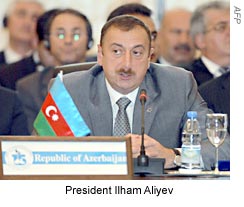New York, July 20, 2007—The Committee to Protect Journalists calls on Azerbaijani authorities to mark the country’s National Press Day on Sunday by releasing the seven journalists jailed in the nation’s prisons. Azerbaijan is the region’s leading jailer of journalists and one of the world’s worst backsliders on press freedom, CPJ research shows.
“The imprisonment of these seven journalists has severely damaged Azerbaijan’s reputation as the country prepares for next year’s presidential elections,” CPJ Executive Director Joel Simon said. “Releasing the seven on National Press Day would be an important first step toward restoring domestic and international trust in Azerbaijan’s commitment to democracy and press freedom.”
Here are the cases:
Sakit Zakhidov, a prominent reporter and satirist for the Baku-based opposition daily Azadlyg,was arrested on June 23, 2006, and charged with possession of heroin with the intent to sell. Zakhidov denied the charge and said a police officer planted about a third of an ounce of the drug in his pocket. His arrest came three days after Ali Akhmedov, executive secretary of the ruling Yeni Azerbaijan party, publicly urged authorities to “silence” Zakhidov. At a June 20 panel on media freedom, Akhmedov said: “No government official or member of parliament has avoided his slanders. Someone should put an end to it.” Zakhidov, who suffers from heart disease, was sentenced to three years in prison on October 4. He was taken to Bailovsk prison in Baku, where he has no access to adequate medical care.
Samir Sadagatoglu, editor-in-chief of the independent newspaper Senet, and reporter Rafiq Tagi were arrested on November 15, 2006, in connection with a November 1 article headlined “Europe and Us.” Tagi, who wrote the article, suggested that Islamic values were blocking development in the oil-rich Caspian Sea nation. The article referred to Islam as a cause of infighting. On May 4, a Baku judge convicted Sadagatoglu and Tagi on charges of inciting religious hatred. Sadagatoglu was sentenced to four years, Tagi to three. On July 6, an Azerbaijani appellate court in Baku upheld the convictions.
Faramaz Novruzoglu of the weekly independent newspaper Nota Bene was sentenced to two years in prison by a Baku court on January 30. He was convicted of criminal defamation for a series of articles critical of Interior Minister Ramil Usubov and other senior government officials. The articles, published in December, focused on friction and corruption in the Interior Ministry. Novruzoglu has also been identified in press reports as Faramaz Allahverdiyev.
Eynulla Fatullayev, editor of the independent Russian-language weekly Realny Azerbaijan and the Azeri-language daily Gündalik Azarbaycan, was sentenced on April 20 to 30 months in prison on charges of libeling and insulting Azerbaijanis. On May 20, local authorities evicted Realny Azerbaijan and Gündalik Azarbaycan from their Baku offices, saying that the building violated safety regulations. On July 3, the Ministry of National Security (MNB) brought additional charges of terrorism and incitement to ethnic and religious hatred against Fatullayev; the ministry interrogated several journalists from Gündalik Azarbaycan the next day.Together, the new charges could mean up to 17 years in prison for Fatullayev. They stem from a commentary headlined, “The Aliyevs Go to War,” published earlier this year in Realny Azerbaijan. The commentary, which focused on President Ilham Aliyev’s foreign policy regarding Iran, contained harshly critical language about the Azerbaijani government. MNB officials did not elaborate on the charges or explain how the piece amounted to terrorism and incitement of hatred.
Rovshan Kebirli, editor-in-chief of the opposition daily Muhalifet, and reporter Yashar Agazadeh were sentenced in May to 30 months in prison apiece on charges of defaming Jalal Aliyev, the president’s uncle and a member of parliament. Jalal Aliyev filed a libel complaint against the journalists after a February article criticized his business activities and those of his family. The story, which relied partly on a Turkish news report, said the Aliyevs’ import-export business profited from the family’s political connections.
